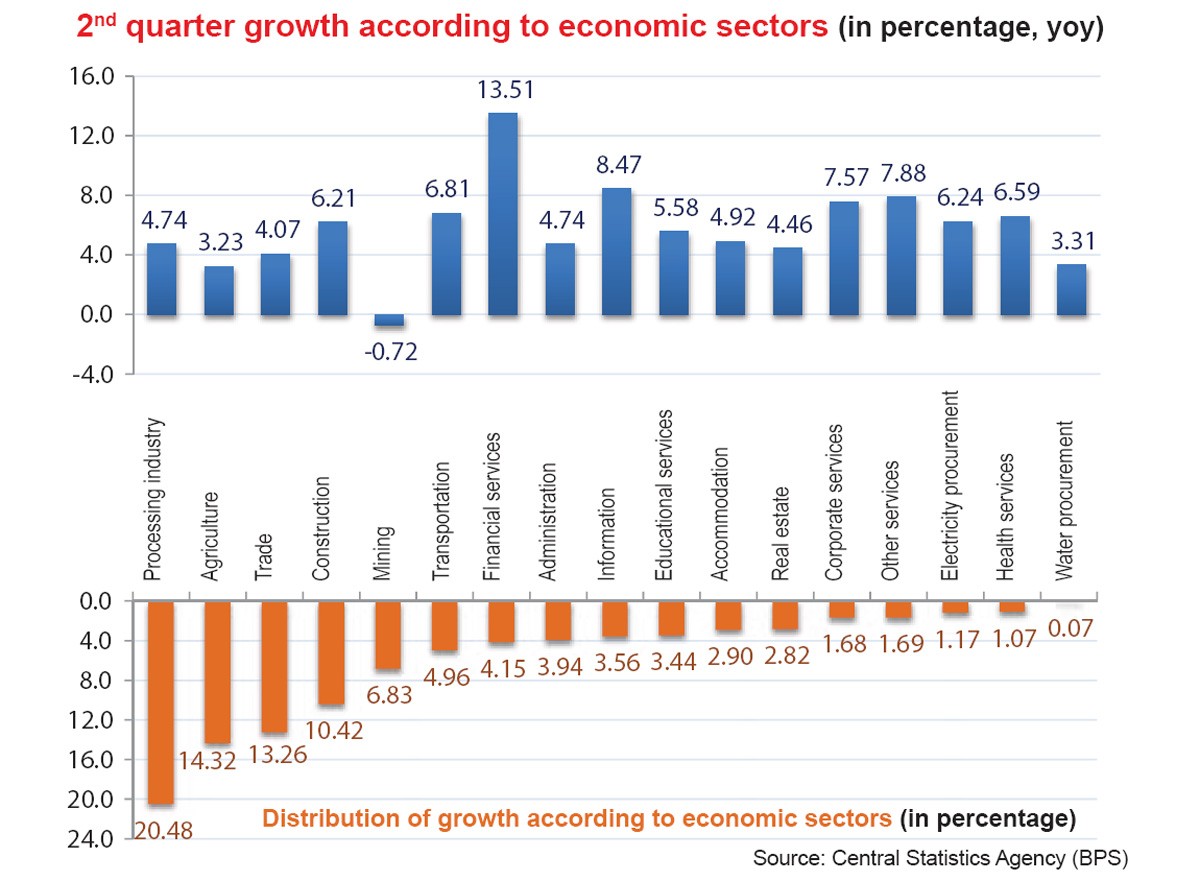Popular Reads
Top Results
Can't find what you're looking for?
View all search resultsPopular Reads
Top Results
Can't find what you're looking for?
View all search resultsIndonesia's GDP target still beyond reach
Change text size
Gift Premium Articles
to Anyone
I
ndonesia’s hopes for economic growth of 5.2 percent by year-end may be unattainable despite higher-than-expected results in the second quarter.
Data published by the Central Statistics Agency (BPS) on Friday reveal that the economy surged 5.2 percent year-on-year (yoy) in the second quarter, beating economists’ average estimate of 5 percent and Bank Indonesia’s (BI) forecast of 4.9 percent.
Gross domestic product (GDP) growth was higher than the 4.9 percent yoy reported in the first quarter and than the 4.7 percent yoy posted in the second quarter of 2015.
The latest result shows that the economy has expanded by 5.04 percent so far this year.
However, economists argue that growth in the second quarter was largely supported by Ramadhan and Idul Fitri festivities, which traditionally make the high growth rate a one-off boost.
At the same time, the result has raised questions on whether the full-year target is feasible.
JP Morgan chief economist for Southeast Asia Sin Beng Ong wrote in a research note that “despite the relatively upbeat second quarter of 2016 GDP outcome, the prospects for a repeat performance are looking slim”.
He attributed his conviction to slow revenue materialization in the first half that was lower than targeted. Overall state revenue only accounted for 35.5 percent of the target, according to Finance Ministry data.
Taxation revenue — supposedly the biggest revenue engine — only made up for 33.9 percent of the target.
With revenues in the second half expected to remain under pressure, JP Morgan predicts that expenditure will still be trimmed, notwithstanding the implementation of the tax amnesty.
“The recently appointed finance minister has already suggested that total expenditures for 2016 could be trimmed by Rp 133 trillion [US$10.13 billion] [1.1 percent of the GDP], with the bulk expected to be back loaded in the second half of 2016,” he said.
UOB economist Ho Woei Chen also highlighted the planned budget cut that she claimed would weigh on the growth outlook in the later part of the year, suggesting that growth target realization could be hindered.
London-based research firm Capital Economics considers it to be too soon to be raising its growth forecasts because the economy continued to face a number of headwinds.
A protectionist business environment, low commodity prices, lagging export revenues and investment and contracted government revenues are among the problems need that to be solved.
For now, it has maintained growth outlook at 5 percent for 2016 and 2017.
Meanwhile, the BPS acknowledged that the second quarter saw high domestic consumption that was triggered by the festivities and by the shift in the harvest period.
The harvest period shifted to May and June as a result of the El Niño climate cycle at the end of 2015.
Domestic or household consumption itself remained the largest contributor to the GDP, accounting for more than half and growing 5.04 percent yoy.
BPS deputy head of balance and statistics analysis Suhariyanto said the first half’s growth of 5.04 percent would be a more accurate reference to figure out how the situation would unfold.
“Last quarter’s 4.92 percent growth was not too bad, especially if you consider other countries’ weak economies. However, if we put our hopes too high, we might end up being disappointed.”
Commenting on the GDP result, Finance Minister Sri Mulyani Indrawati said economic growth now relied on the government and private consumption because investment had expanded only slightly and exports and imports remained in negative territory.
However, Asian Development Bank (ADB) economic analysis director Edimon Ginting said the key to pushing growth higher laid with investment, not state expenditure, citing its limited amount.
______________________________
To receive comprehensive and earlier access to The Jakarta Post print edition, please subscribe to our epaper through iOS' iTunes, Android's Google Play, Blackberry World or Microsoft's Windows Store. Subscription includes free daily editions of The Nation, The Star Malaysia, the Philippine Daily Inquirer and Asia News.
For print subscription, please contact our call center at (+6221) 5360014 or subscription@thejakartapost.com










